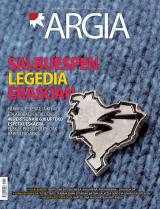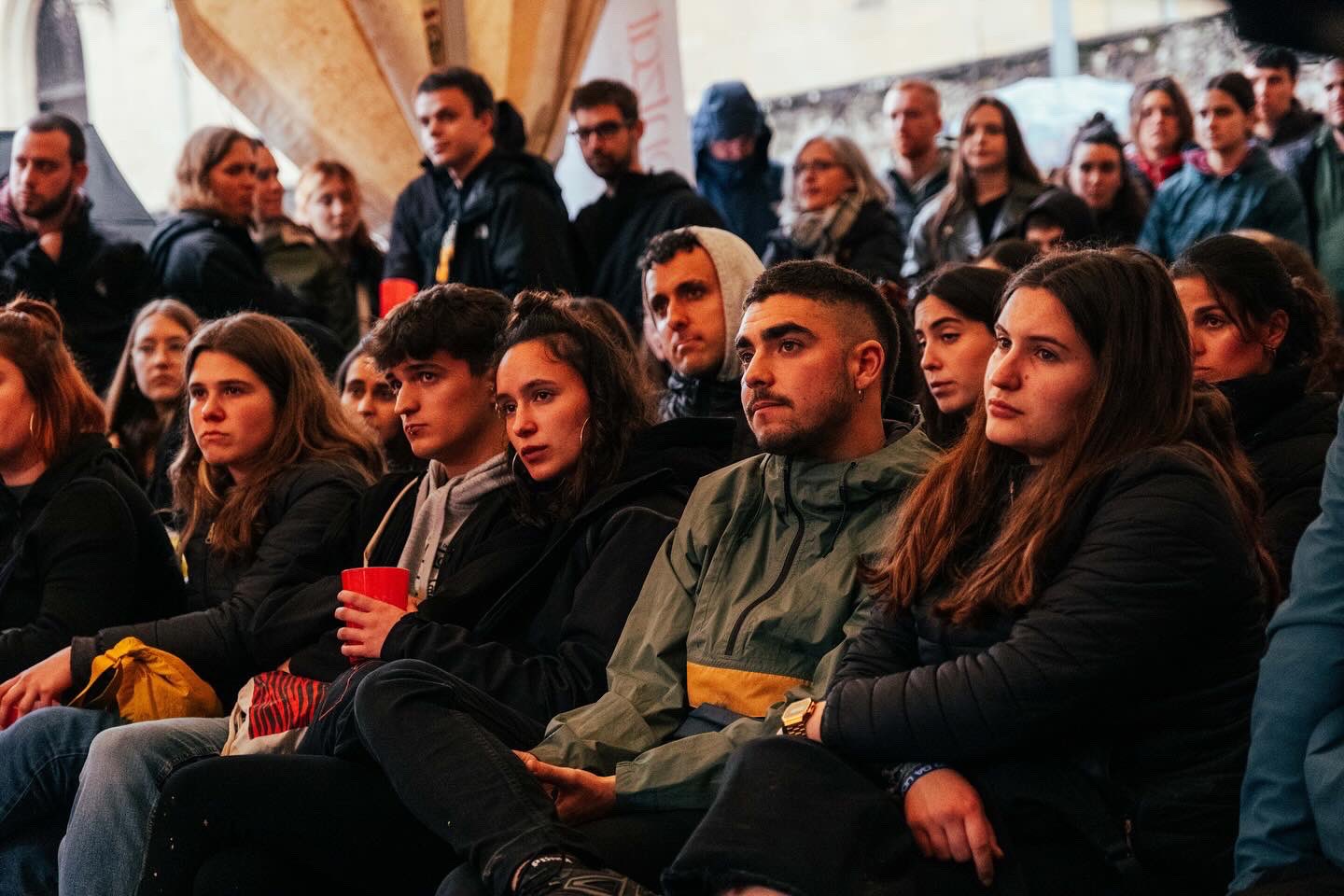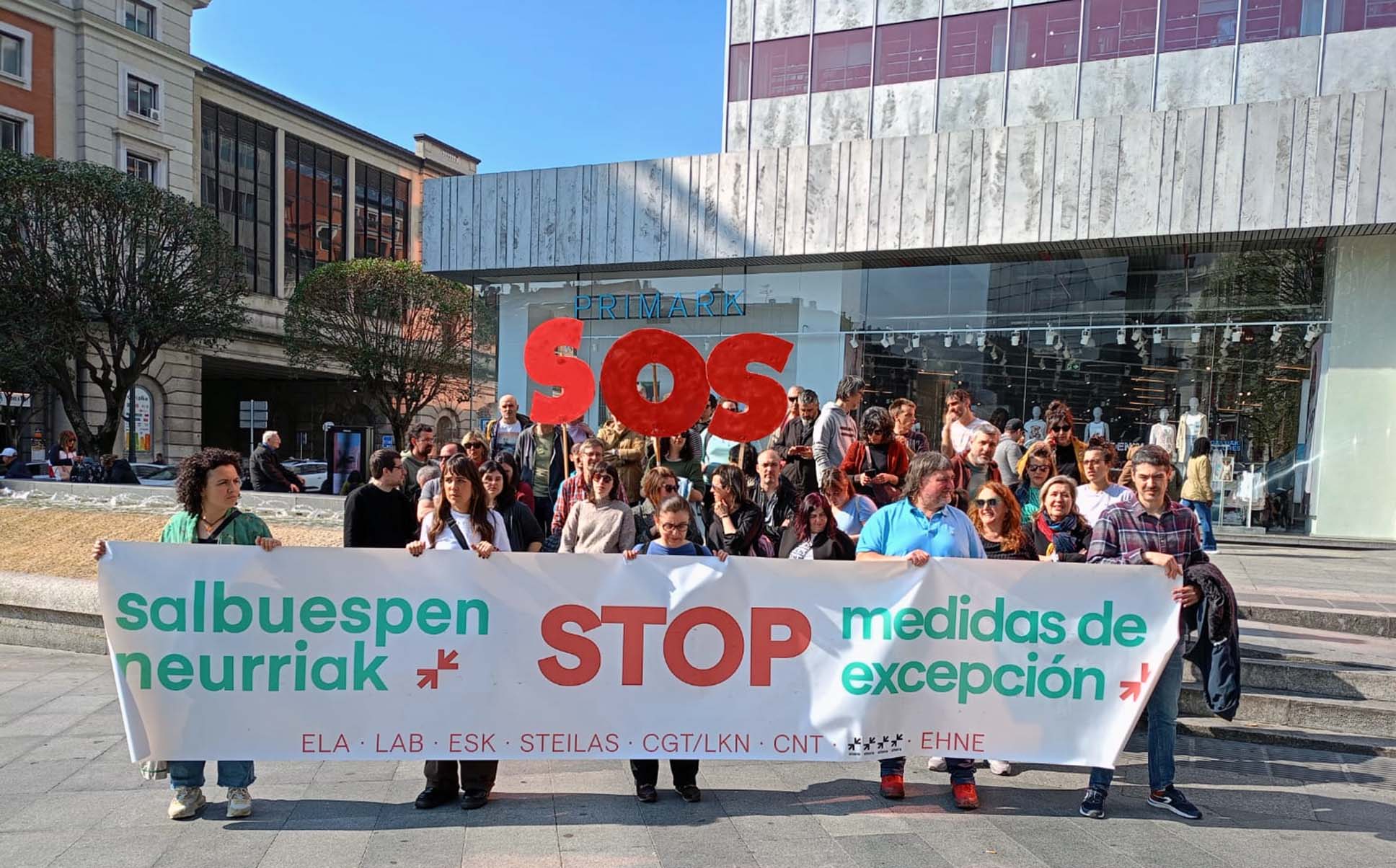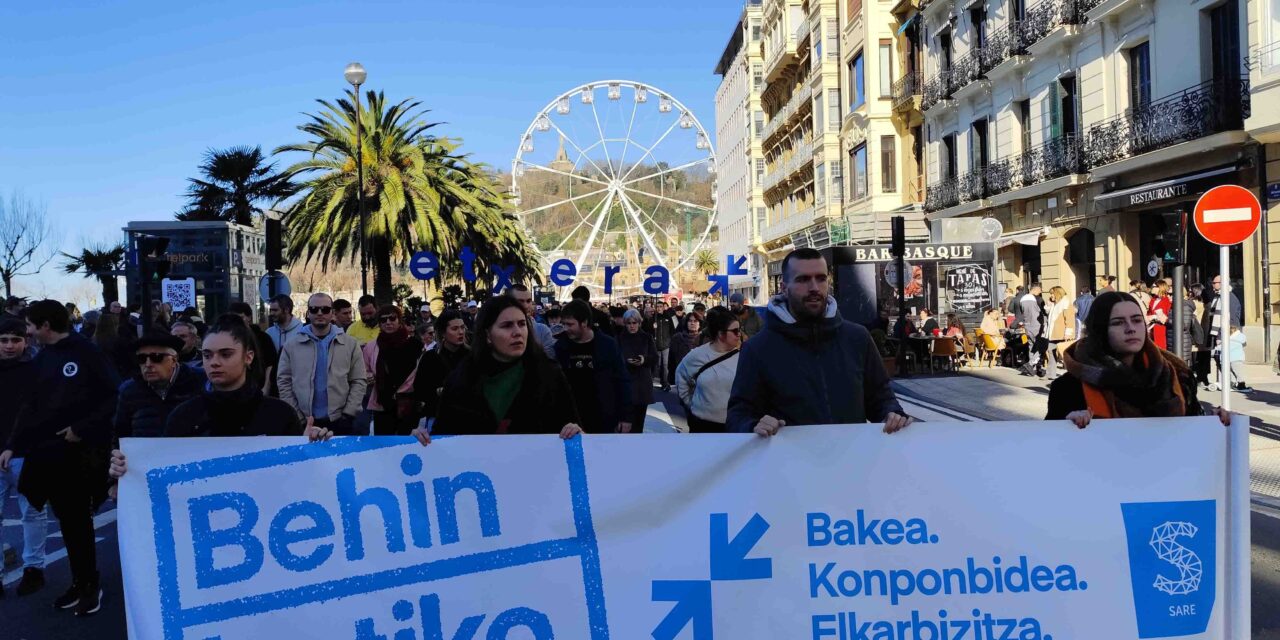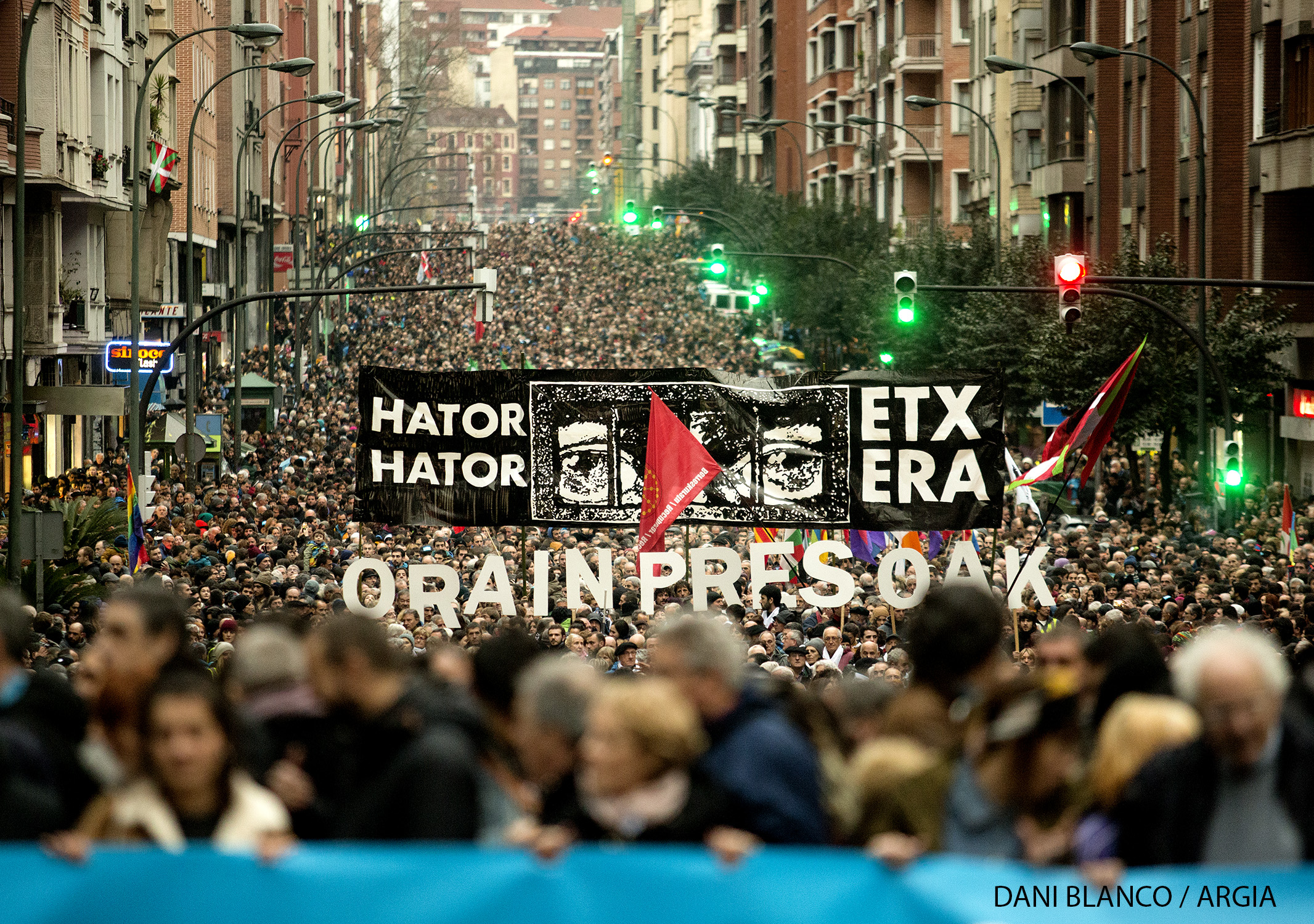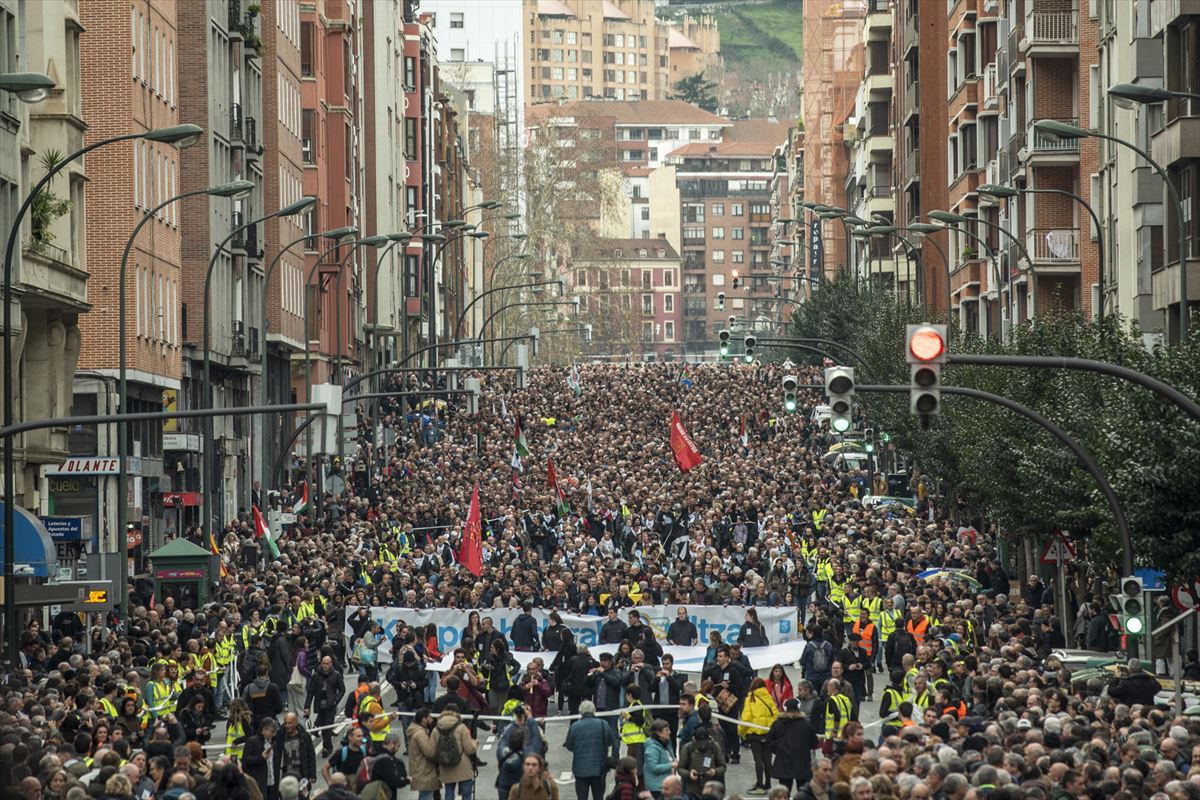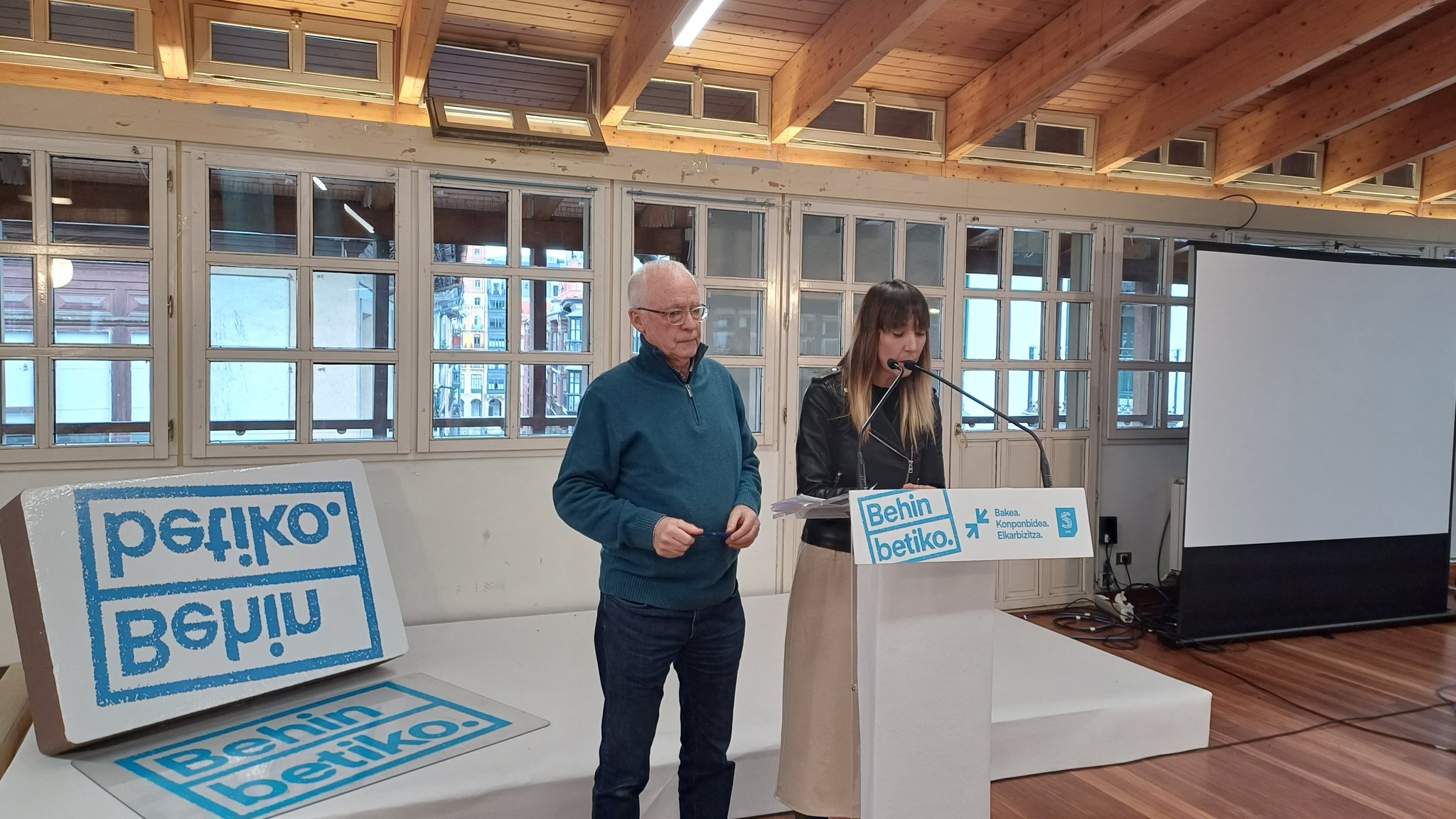Herrira case: 600 years in prison for supporting prisoners
- Defending EPPK prisoners is more dangerous in 21st century Spain than in red Franco. Or do political work for them, attend to their rights or economically protect their relatives. The exceptional thing is that the ETA doctrine is still alive.
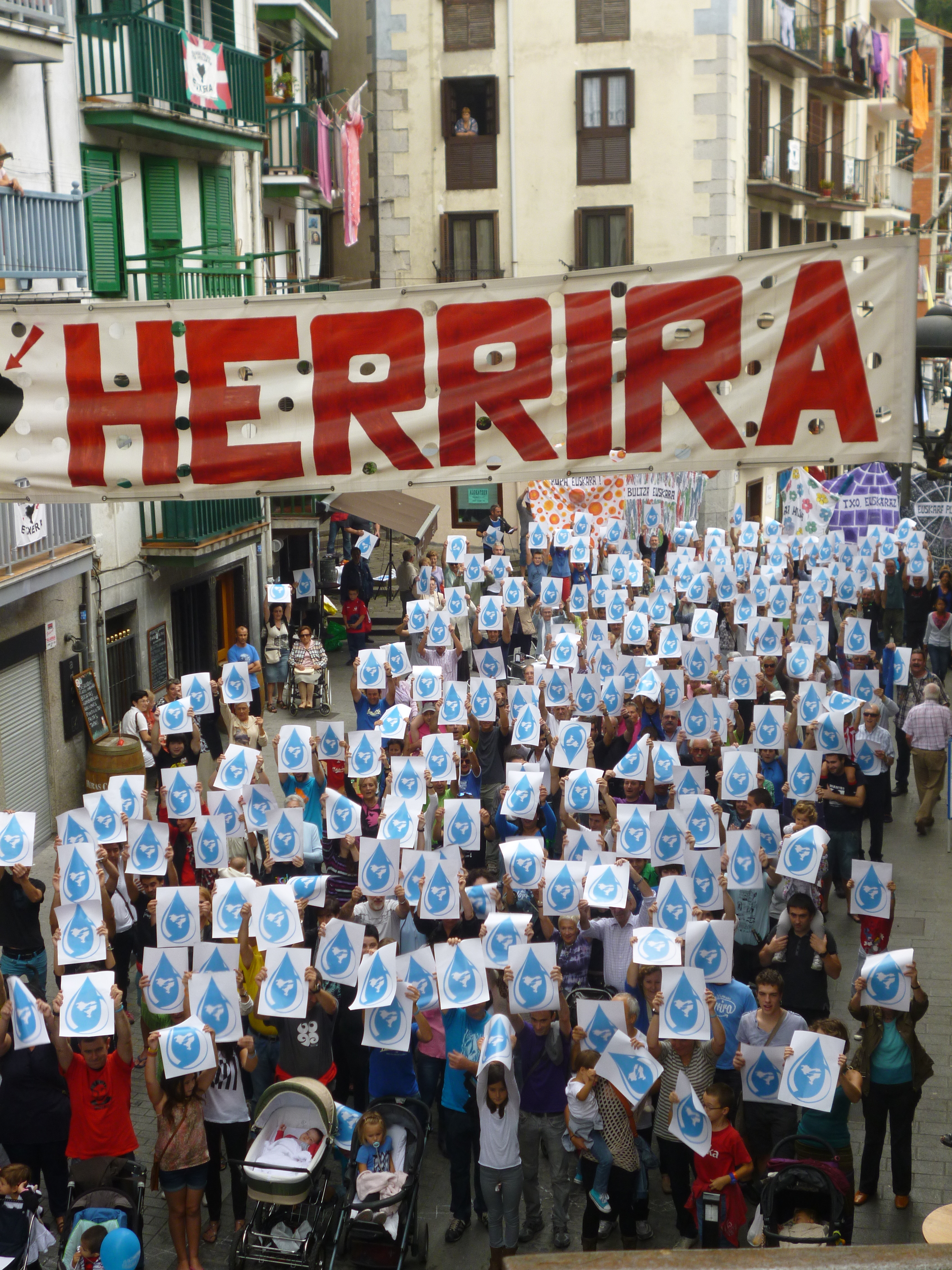
On 20 October 2011 ETA informed Basque society of the most important decision in its history: to abandon the armed struggle. On this occasion, the whole of society believed what the armed organization said, from the most suspicious office in Madrid to the last kitchen of the Basque society. The end of suffering already had a start date.
The Basque society took the stone off the top and put another behind it, hoping to be more lucky than Sisyphus: it was time to start building peace. They began to dance the concepts of truth, justice, reparation, etc., everywhere. Hope dispersed here and there, even in the world of Basque political prisoners.
It was known that the same thing was not going to happen in Ireland, where the cessation of arms and the release of prisoners was linked by negotiation. The Abertzale left knew that any benefit to prisoners was going to be a slow process, especially the release of prisoners. But not so much. There was no step in the area of sick prisoners, in the processes of rapprochement, or in other prison benefits. And it's not yet. On the contrary, the People ' s Party Government, far from making prison policy more flexible, resorted to punishing the world of prisoners ' help as it had never done: Between 2012, 2013 and 2014, he detained and prosecuted 48 people from different structures created to support Basque prisoners: they were all ETA.
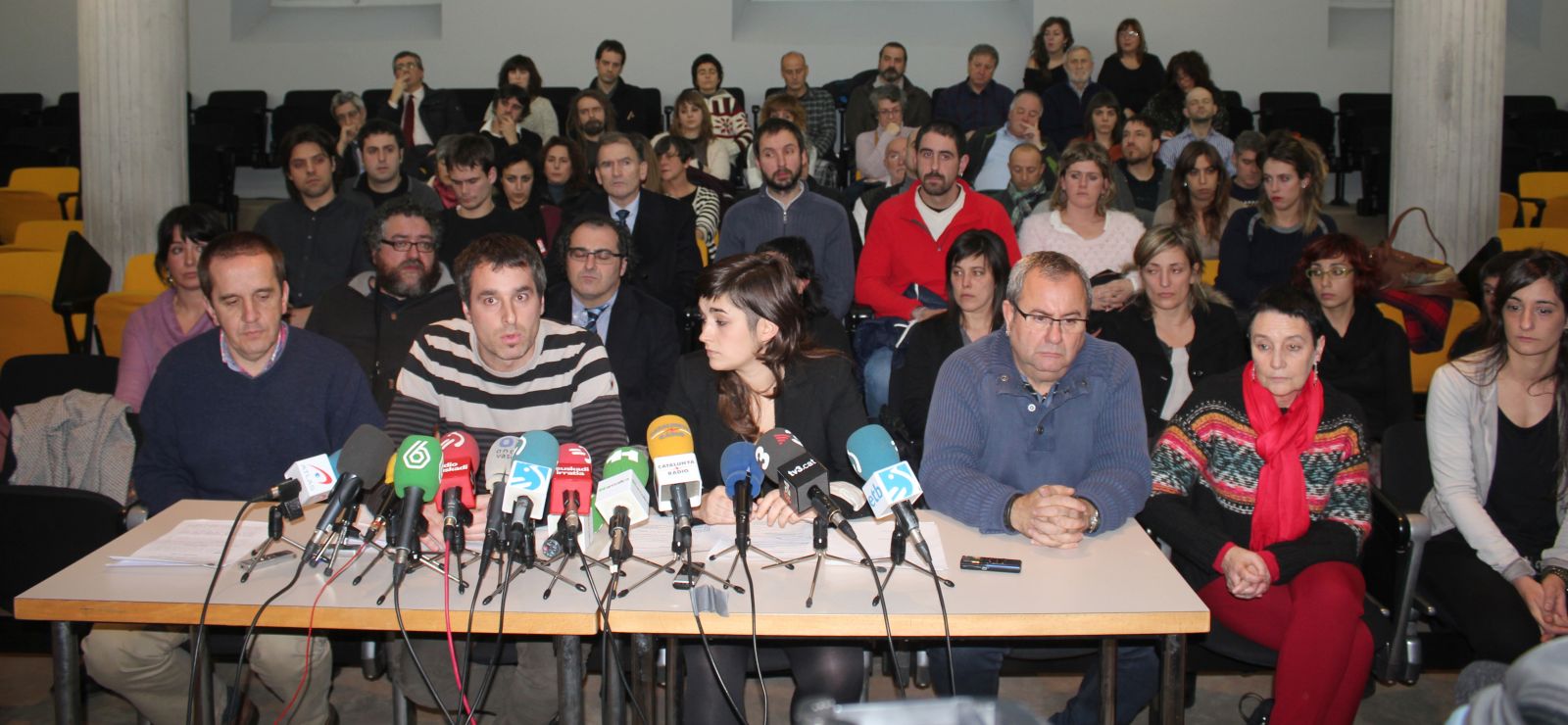
ETA's "prison front"
Thus emerged the Herrira case or what in the National Court call “the case of the penitentiary front”, by law case 11/2013. Since the creation of the first ETA prisoners in the 1960s, they have been lawyers in charge of their defence; or large sections of the population that have supported them economically or politically in society, organized in different ways. That's what it was in 1978, 1998 and 2017. The National Court calls ETA's "prison front" and calls for 8-21 years of imprisonment for 48 people for a crime of belonging to this front.
Under the ETA doctrine, the National Court illegalized at the beginning of the last decade the Pro Amnesty Movement and the Askatasuna organization and sent dozens of people to prison. The Herrira case is, according to the Court, the last chapter of those movements that were led by ETA and that all those who exercised leadership or paid work know that this is the case.
It is all about tackling this "prison front" that without ETA's legal umbrella was unjustifiable, and proof of this is that the Pro Amnesty Movement was banned in 2001, not earlier, by Spanish justice. Everything is known how ETA was justified at the time of ETA’s armed activity. But how does the investigating judge, Eloy Velasco, justify recourse to them after the cessation of ETA’s armed struggle? When he decided to abandon armed activity, he changed the “terrorist activity of the past” to “the accumulation of forces”, “with this last concept reference is made to a new strategy of the whole Abertzale Left, called “democratic process”, whose objective is to bring together as many political and social forces as possible to recognize Euskal Herria as a nation and to achieve his right to decide”.
In other words, it is indifferent that ETA should stop acting and be willing to hand over arms; and it would not be the same if it were to sell dolls on the street, because it is not about what is done, but about who is in service. The Prosecutor’s Office considers that all these providers of assistance to prisoners are under ETA’s orders and that the defendants know this and are therefore members of ETA.
The judge divides the accused into five groups: The Herrira movement, lawyers, the EPPK mediation group, ETXERAT and Jaiki Hadi (association responsible for the physical and psychological health of prisoners). All the activities that accuse them are those carried out in 2012, 2013 and 2014: they raise funds for EPPK prisoners, carry out campaigns for prisoners, organize tributes when they are released, lawyers, defense works of psychologists and doctors, mediation work with other agents of society... Several groups are in charge of their coordination, sometimes called the Coordination Center and the next Coordination Group. Above all, there is the “Halboka”, written with h in judicial documents, according to police sources, the structure of ETA that heads the “prison front”. There are ten Basques charged as members of “Halboka”.
“EPPK Control”
According to the Prosecutor’s Office, “the Herrira say they have nothing to do with AAM or Askatasuna, but they do what those organizations did.” And for the same purpose: “Political control of the EPPK” (…) “Because the cohesion of EPPK prisoners and their fidelity to ETA is key to the development of the new strategy of the terrorist organisation and to the achievement of its objectives”.
Interestingly, at another time the prosecution says that it is key for ETA that EPPK prisoners do not accept any Spanish penitentiary legislation and that achieving this is also the task of the “prison front”. The EPPK, for its part, has announced that it accepts this legality in its debate from 2011 to the present. In 2011 he began the internal debate and at the end of 2013 announced that he “recognized the damage caused” in the conflict and that he was going to start the debate to accept the individual routes offered by Spanish legislation. In July 2017 he announced that it was good for EPPK members to accept the legal benefits, unless they were forced to go beyond two lines: repentance and denunciation.
When Herrira was founded in 2012, he publicly stated that his main task would be to assist in the process that prisoners and exiles of the EPPK would have to carry out, facilitating the communication of prisoners and social agents, favouring the debate of prisoners and exiles and, ultimately, supporting the active participation of prisoners in the orderly end of the conflict.
The investigating judge does not attach importance to the armed post-fighting period, since he considers that the many documents intervened clearly show the relationship between these associations and institutions with ETA. In any case, it does not seem entirely clear, since in the first chapter of the indictment the instructor declares about the Herrira association: “No documents showing a clear relationship between Herrira and ETA have been found in the seized documentation.” So how are the members of Herrira ETA members?

Doubts about the case also among judges
In fact, all the evidence referred to in the Public Prosecutor’s Office’s complaint is prior to 2012, so it should not affect the defendants. At least that is what the appeal you have as rapporteur to Cándido Benjam-Pumpid in response to an appeal on the processing of Iñaki Goioaga. The court rejected the appeal of unconstitutionality against Goioaga, but left on the table a number of interesting concepts such as the evidence: “Documentary evidence prior to the time of the alleged crimes under investigation cannot be taken into account at this time, as there is thus a serious risk of anachronism.”
In response to the appeal, it is said that “the time when the alleged crimes were committed, which are those of 2012, 2013 and 2014, that is, those that have left the armed actions by the terrorist organization, must be accurately assessed”. Moreover, it is emphasized that “activities aimed at the ultimate disappearance” of ETA cannot be considered as criminal accomplices or collaborations, especially when they “are not aimed at committing terrorist acts”.
There are many doubts, and also José Ricardo de Prada, from the Second Section of the Criminal Chamber who brought this case forward, made public his particular vote. For a number of reasons, I disagreed with the processing. For example, he considers that police reports have “many times valuable consequences”, “beyond being objective facts”. The footprints and interpretations that have been made of them have not been able to conclude that “there has been terrorist activity. On the contrary, they highlight the evolution of ETA’s terrorist means towards political activity.” De Prada has warned that actions aimed at political settlement cannot be prosecuted and that “non-recognition of prison legality” can have consequences for the prisoner “but cannot be criminalized”.
It is the opinion of jurists, citizens and many others: such a case should be unfeasible in the rule of law, but in the world of the exception that was built in the fight against ETA everything is possible: before confronting the armed organization and now to avenge itself, to hinder the peace process that Basque society needs or to punish Catalan independence.

THE TRIAL COULD BE HELD TOWARDS AUTUMN 2018
The case was examined by Judge Eloy Velasco of the National Court. The jury is composed of Alfonso Guevara – president –, Clara Bayarri – rapporteur – and Gillerto Ruiz Polanco. The prosecutor has called for nearly 600 years in prison for the 48 accused of sexual abuse. They are all accused of belonging to armed gangs, except one who, in their opinion, is accused of collaborating with armed gangs. All the events charged against them date back to 2012, 2013 and 2014, following the end of ETA’s armed struggle – 20 October 2011.
Judge Guevara is very controversial in the National High Court for her unabridged tone or for clashes with other colleagues and drivers, among other reasons; however, she also has a reputation of severe and is said not to be respected when other powers try to enter its scope.
Clara Bayarri is known as a progressive in the Spanish trial and, for example, in the judgment that issued a particular vote in the macrosumario of the Herriko Tabernas, showing his disagreement with the sentence imposed. In their opinion, the majority of those convicted at the time were essentially in political activity, the crimes against them were not covered by the penal code and, furthermore, there was insufficient evidence to link the defendants with ETA.
The oral trial for the Egunkaria case has not yet taken place and it seems that it will take a long time. Apparently, it will not take place before the fall of 2018. At the end of September, the Public Prosecutor’s Office filed a petition for punishment, and now the particular indictment, exercised by the AVT and Dignity and Justice, has to make its demands. It will then be the turn of the lawyers’ written defence.
CRIMINAL REQUESTS IN PRISONS
Herrira
Fran balda: 21 years
Amaia Esnal: 13 years and 6 months in
Eneko Ibarguren: 13 years 6 months
Ekain Zubizarreta: 13 years 6 months
Roberto Noval: 13 years 6 months
Ibon Meñika: 15 years
José Antonio Fernández: 15 years
Óscar Sánchez:
Gorka González: 13 years and 6 months. 14 years and 3 months
Jon Garai: 13 years and 6 months in
Sergio Labay: 13 years 6 months
Manu Ugartemendia: 13 years and 6 months
Eneko Villegas: 13 years and 6 months
Nagore García: 13 years and 6 months of
Jesus Mari Aldunberri: 13 years 6 months
Beñat Zarrabeitia: 13 years and 6 months
Ane Zelaia: 13 years 6 months
Imanol Karrera 13 years and 6 months
Jon Mindegiaga: 15 years
Javier Carvallido: 17 years
Nagore San Martín: 17 years
Emilie Martin: Unspecified
EPPK mediator Arantza Zulueta: 14 years
Jon Enparantza: 14 years
José Luis Campo: 12 years
Asier Aranguren: 12 years
Aitziber Sagarminaga: 12 years
Egoitz Lopez de la Calle: 12 years
Aintzane Orkolaga: 12 years of
Mikel Almandoz: 12 years in
Naia Zuriarrain: 8 years
Lawyers
Alfonso Zenon: 11 years
Kepa Mantzisidor: 11 years
Eukene Jauregi: 11 years
Ane Ituiño: 11 years
Aiert Larrarte: 11 years
Ainhoa Bablieto: 11 years
Arantza Aparicio: 11 years
Onintza Ostolaza: 11 years
Haizea Ziluaga: 11 years
Amaia IZKO: 11 years
Jaione Career: 11 years
Atxarte Salvador: 11 years
Iñaki Goioaga: 11 years
Jaiki Hadi
Fernando Arburua: 11 years
Oihana Barrios: 11 years
Etxerat
Izaskun Abaigar: 11 years of
Nagore Lopez de Luzuriga: 11 years
Comments
- All are asked for 11 years for ETA membership
- 9 defendants accused of recidivism and considered aggravating (11 + 1)
- 19 defendants charged with the outbreak of terrorism (2 years and 6 months)
- 3 accused of a terrorist group financing offence at 3 years ' imprisonment
- All are asked for 12 years of special disqualification for employment and public office, 10 years of total disqualification and 8 years of probation.
“Saihestu egingo dira giza eskubideen, ordenamendu juridikoaren eta espetxeetako tratamendu psikosozialaren aurkako balioak eta jarrerak babestea, justifikatzea eta goratzea ekar dezaketen adierazpenak”, dio, besteak beste, agiriak. Azaroan Eusko Jaurlaritzako... [+]
Asteazken eguerdian berreskuratu du askatasuna astigartarrak, zigorra osorik beteta. Espainiako Auzitegi Nazionalak otsailean inputatu zuen ETAren zuzendaritzako ustezko beste lau kiderekin batera, Gregorio Ordoñezen hilketa leporatuta.
Martxoaren 13an lau urte bete dira Fran Balda arbizuarra istripuz hil zela. Preso, iheslari eta deportatuen etxeratzearen alde egin zuen lan, eta haren bost kidek idatzi diote gutun hau.
Frantziako Poliziak 2002an atxilotu zuen zumarragarra, eta 30 urteko zigorra betetzen ari da. Sare Herritarrak mobilizazioa deitu du datorren ostiralerako, Urretxuko Potros Plazan.
Iratxeren Bidasoaldeko Lagunak ekimenak deituta, dozenaka lagun kalera atera ziren atzo Iratxe Sorzabal preso politiko irundarraren absoluzioa eskatzeko eta behingoz etxera ekartzeko, torturak salatzeaz gain.
Sare Herritarrak antolatuta, pasa den urtarrilaren 11n Bilboko kaleak bete zituen manifestazio jendetsuaren ondoren, berriz sortu da eztabaida, euskal presoei salbuespen legeriarik aplikatzen ote zaion. Gure iritzia azaltzen saiatuko gara.
Espetxe politikan aldaketa nabarmena... [+]
Just as we experienced the flourishing of the Basque Country with the help of the artists, so that this time, taking advantage of their impulses, we continue to make our way together giving the necessary support to the Basque political prisoners, exiles and deportees
The... [+]
Jar gaitezen 2025erako proposamen politiko gisa, Espainiako Auzitegi Kolonialaren (AN) epai guztiak berrikusten hasteko eta makila bakoitzak bere belari eusteko.
Unionismoarekin lerrokatutako alderdi, sindikatu eta gizarte-erakunde gehienek, eta ez bakarrik horrela... [+]
Next Saturday, 11 January, the Sare citizens' network called for a new demonstration in Bilbao in defence of the rights of Basque prisoners. This is a unique opportunity to move forward on the path of coexistence in our people, after decades of violent confrontation and, even... [+]







